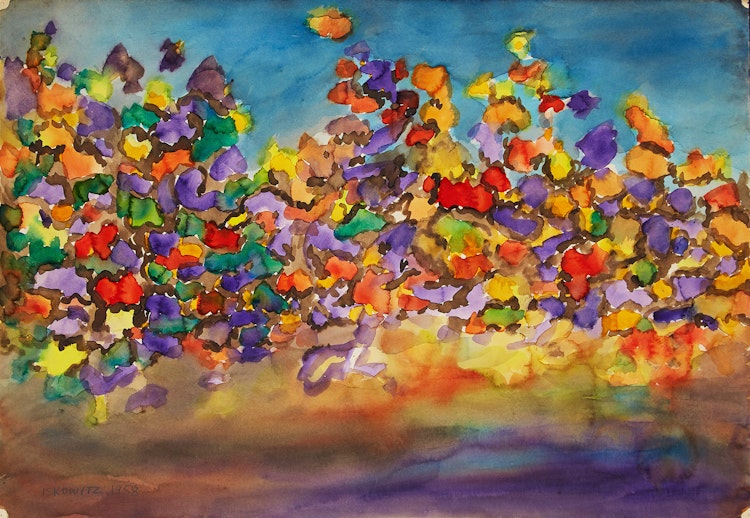Untitled (Parry Sound Variation Work) by Gershon Iskowitz

Gershon Iskowitz
Untitled (Parry Sound Variation Work)
watercolour
signed and dated 1958 lower left; inscribed “C226” on the reverse; unframed
15 x 22 ins ( 38.1 x 55.9 cms ) ( sheet )
Auction Estimate: $900.00 - $1,200.00
Price Realized $1,800.00
Sale date: June 24th 2021
Collection of the artist
Gershon Iskowitz Foundation
Iskowitz began painting tree and landscape compositions in Parry Sound and continued to develop his watercolours. The earliest watercolours, done in Toronto, are dated 1951, which include a number of still life flower compositions. They were rarely if ever exhibited but a 1956 still life is in the collection of the Art Gallery of Ontario.
This 1958 Parry Sound watercolour is nature observed, but not in a literal way and offers a hindsight indication for Iskowitz abstract watercolours to come. Arguably, these works are the foundation of Iskowitz’s abstract paintings although the approach and technique are vastly different. The abstract paintings were layered and worked over time, whereas his watercolours from the Parry Sound period and continuing – the Parry Sound “Variations” from 1965 (the first Iskowitz works to enter public collections in 1966), the “Western Sphere” watercolours of 1969, and his best known 1977-dated watercolours – were immediate and experiential.
See:
https://www.aci-iac.ca/art-books/gershon-iskowitz/key-works/parry-sound-i
Watercolours dated 1955 and 1958, comparable to the “Parry Sound Untitled” 1958, are now in the Art Gallery of Ontario collection.
Proceeds from this sale will benefit the charitable not-for-profit Gershon Iskowitz Foundation, which awards an annual prize to a professional Canadian visual artist for their ongoing research and artistic production.
Share this item with your friends
Gershon Iskowitz
(1919 - 1988) RCA
Born in Kielce, Poland, in 1919, Gershon Iskowitz immigrated to Canada in 1948 after surviving two Nazi concentration camps (Auschwitz labour camp in Poland and later Buchenwald, near Weimar, Germany). As a child, Iskowitz had an aptitude for art. He created advertisements for his local movie theatre in a section of his family’s living room that his father portioned off to create a small studio.
Following the Nazi occupation of Poland, Iskowitz was placed in the Kielce Ghetto. Once liquidated, Iskowitz was imprisoned in concentration camps in Poland and Germany. While he continued to make drawings during this period only two survive: Condemned (1944-46) and Buchenwald (1944-45). Upon liberation, he lived in the Feldafing Displaced Persons Camp and audited courses at the Academy of Fine Arts in Munich.
Upon receiving a temporary travel document from the Military Government for Germany, issued to stateless people, Iskowitz traveled to Canada via the United States in 1948 where his extended family greeted him at Union Station in Toronto. Until 1954, Iskowitz’s paintings focused on memories from his imprisonment. In the same year, he was included in the Canadian Society of Graphic Art exhibition at the Art Gallery of Ontario (AGO) alongside Painters Eleven artist Oscar Cahén.
By the 1960s Iskowitz’s style transformed from gestural to abstract. He became interested in exploring the Canadian landscape rather than his wartime memories during this period. After exhibiting at Gallery Moos in October 1964, for the first time, Iskowitz formed a close relationship with the owner, Walter Moos. Moos managed Iskowitz’s career and finances from this point forward. After receiving a Canada Council grant in 1967 he flew to Churchill, Manitoba. Entranced by aerial views he saw while in flight, Iskowitz began incorporating this perspective into his art.
Iskowitz was selected to represent Canada alongside Walter Redinger at the Venice Biennale in 1972 where he displayed four of these areal diptychs. In 1982, the AGO put on a retrospective exhibition of Iskowitz’s life work. After the retrospective exhibition had concluded, Iskowitz set up a foundation that would provide financial support to artists through an annual monetary prize, with assistance from Moos.
Literature Source: Ihor Holubizky, Gershon Iskowitz: Life and Work. Toronto: Art Canada Institute, 2018 (https://aci-iac.ca/art-books/gershon-iskowitz)
We extend our thanks to Danie Klein, York University graduate student in art history, for writing and contributing this artist biography.

